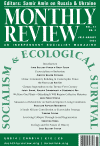Socialism

Lula’s electoral victory may have reinvigorated the Brazilian left, but the destruction wrought by ultraconservative ex-president Jair Bolsonaro presents a monumental task for the new government. Rosa Marques and Paulo Nakatani review the challenges Lula has faced with an eye to those still to come. | more…

Monthly Review editors remember the life of MR editorial board member John J. Simon (1934–2022), a dedicated socialist, towering figure in radical publishing and broadcasting. | more…

Steve Ellner analyzes the debate surrounding the wave of elections of left-leaning political leaders in Latin America, known as the Pink Tide. Critics of these governments, Ellner suggests, emphasize their shortcomings at the expense of recognizing their anti-imperial position. | more…

The Half-Earth movement calls for rewilidng half the earth as a means of combating the planetary crisis. Brian Napoletano explores the implications of the Half-Earth approach as outlined Vettese and Pendergrass’s Half-Earth Socialism. | more…

In this prescient chapter from 1982, author and activist Anne Braden draws a direct line from the anti-Communist witch hunts of the McCarthy Era to state repression of mass movements from the civil rights era to the rapid expansion of the racist police state that continues to this day. This chapter is reprinted from Anne Braden Speaks (Monthly Review Press, 2022). | more…

How the Workers’ Parliaments Saved the Cuban Revolution brings us to the heart of one of the most precarious and transformational moments in Cuba’s evolution. As the Soviet Union fell to pieces in the 1990s, Cuba managed to evade the fate of its primary trading ally. How was this possible, especially as Cuba endured relentless attacks from the capitalist behemoth directly to its north? | more…

A visit to a Venezuelan commune reveals a fascinating look into the creative ways communards forge ways of life in urban centers, and how these projects intersect with the much-needed transformations required for a grassroots and socially integrated ecology. | more…

The Soviet Union’s efforts at centralized economic planning suffered greatly by neglecting to integrate cybernetics into a comprehensive model. Today, this cybernetic approach to economic planning is still blocked. The time has come to implement alternative planning in the form of an automated model that coordinates the activities of all industries and sectors of toward a prosperous and sustainable future. | more…

Over the last 11,700 years, during which human civilization developed, the earth has existed within what geologists refer to as the Holocene Epoch. Now science is telling us that the Holocene Epoch in the geological time scale ended, replaced by a new more dangerous Anthropocene Epoch, which began around 1950. The onset of the Anthropocene Epoch is characterized by an “anthropogenic rift” in the biological cycles of the Earth System, marking a changed reality in which human activities are now the main geological force impacting the earth as a whole, generating at the same time an existential crisis for the world’s population. | more…

Finally, and for the first time, we have full access to a representative collection of Anne Braden’s writings, speeches, and letters, and the full spectrum of their subject matter: from the relationship between race and capitalism, to the role of the South in American society, to the function of anti-communism. | more…

Between 1949 and 1980, over a hundred articles in Monthly Review dealt with the Soviet Union directly, with many more addressing it indirectly. But, after 1993, treatments of post-Soviet Russia in the magazine largely ceased. | more…

Time is running out for humanity to avoid a catastrophic planetary tipping point. Widespread mass mobilizations of populations worldwide must fight to bring about revolutionary societal changes and dismantle neoliberal monopoly capitalism, with its reliance on extractive exploitation of our planet’s resources and communities. | more…










